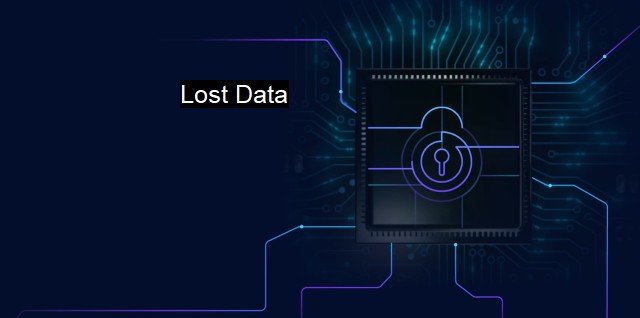What is Lost Data?
Understanding Lost Data: Risks, Causes, and Consequences in Cybersecurity and Antivirus
Data is one of the key components of our daily lives. From personal documents to financial records, photos, videos, and other important files, we rely on data to conduct business, communicate, stay informed about the world around us, and more. data can easily become lost or corrupted due to a variety of reasons such as malware, system failure, accidental deletion, or human error. This is where the concept of lost data comes into play, particularly in the context of cybersecurity and antivirus.Lost data refers to information that has been deleted, corrupted, or made inaccessible due to various factors. Cybercriminals, may use malware such as viruses, Trojans, ransomware, or spyware to steal data from unsuspecting users. When this happens, the attacker may delete or modify the stolen data to cover their tracks or make it harder for the victim to recover the information. Similarly, outdated or malfunctioning antivirus software can unintentionally delete or quarantine legitimate files, resulting in lost data.
The consequences of lost data can be severe. Individuals may lose irreplaceable family photos, important documents, work files, financial records, or other valuable information. Businesses may experience significant downtime, reputational damage, lost customers, and litigation costs. lost data can also result in regulatory non-compliance, data breach incidents, and other legal violations.
To mitigate the risks of lost data, individuals and organizations need to implement effective data backup, recovery, and protection practices. These include regularly backing up important data to secure locations such as cloud storages or external hard drives, using robust antivirus and cybersecurity software that can prevent malware attacks, opting for software and operating system updates to fix vulnerabilities, and educating employees or other users on safe cybersecurity practices such as avoiding clicking on suspicious links, opening questionable attachments or providing personal data to unknown entities. It is essential to use a data recovery tool that can help with restoring your data in the event of data loss.
antivirus software plays a critical role in safeguarding against potential malware breaking into systems causing data loss. One of the most important features of antivirus software is the ability to detect and remove known and unknown types of malware before they infect the system. This requires regular updates of virus definitions and machine learning to detect previously unknown zero-day attacks, preventing threats from inflicting damage by probing and fortifying the weak points of your system.
antivirus software provides vital protection for data integrity. The software will detect and quarantine potential risks before, after and during an attack helping recover from extensive damage caused by ransomware like CryptoLocker, Trojans and other types of Malware.
lost data is a consequence of poor or flawed cybersecurity practices, which can have serious ramifications on individuals and businesses. Therefore, there is a need to create awareness on the impact and benefits of a solid cybersecurity policy, reinforce a culture of information security, and invest in the cybersecurity infrastructure of networks, systems, and cybersecurity software with current updates and regular monitoring using security management platforms for individuals, enterprises, corporations, and MSPs offering secure tools in this era. With cybersecurity policies, investment, and a well-aligned cybersecurity incident response methodology, individuals and organizations can better protect their assets, prevent data breach and loss, and ensure business continuity and growth.

Lost Data FAQs
What should I do if I have lost data due to a virus attack?
If you have lost data due to a virus attack, the first thing you should do is disconnect your device from the internet and any network connections. Next, run a full scan of your device with your antivirus software to remove any remaining traces of the virus. If your files are still missing, you can try using data recovery software or contacting a professional data recovery service.Can antivirus software always prevent data loss caused by a virus?
While antivirus software is designed to detect and remove viruses, it cannot guarantee 100% protection against all threats. Some viruses may still be able to slip through the cracks and cause damage to your data. It is important to always have a backup of your important files and regularly update your antivirus software to ensure the best possible protection against threats.Is it possible to recover lost data after a virus attack?
Yes, it is possible to recover lost data after a virus attack. If you have a backup of your data, you can restore it from the backup. If you do not have a backup, you can try using data recovery software to recover your lost files. However, there is no guarantee that all of your lost files can be recovered.How can I prevent future data loss due to a virus attack?
To prevent future data loss due to a virus attack, it is important to have reliable antivirus software installed on your device and keep it updated. You should also avoid downloading files and software from untrusted sources and be cautious when opening email or attachments from unfamiliar senders. Regularly backing up your important data is also essential to ensure that you have a copy in case of any unexpected events.| | A | | | B | | | C | | | D | | | E | | | F | | | G | | | H | | | I | | | J | | | K | | | L | | | M | |
| | N | | | O | | | P | | | Q | | | R | | | S | | | T | | | U | | | V | | | W | | | X | | | Y | | | Z | |
| | 1 | | | 2 | | | 3 | | | 4 | | | 7 | | | 8 | | |||||||